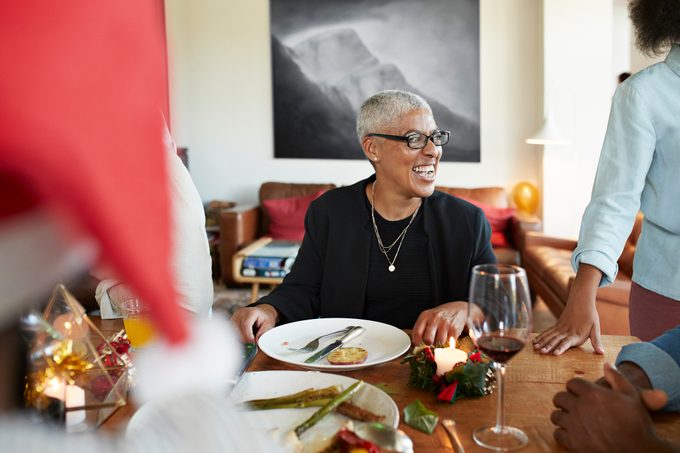
Most food pushers are well-intended, if misguided, but others may be trying to hurt or sabotage you. Here are expert tips to help handle every type of food-pushing situation you may encounter this year.
Festive foods
“It’s the holidays. Let loose a little bit!”
“One drink won’t wreck your diet!”
“You need to eat more; you’re too skinny!”
“Just try a bite. I worked all day cooking this. I promise you’ll love it!”
If you’ve shared a meal with other people, chances are you’ve heard someone try to push someone else to eat or drink. And the holidays are primetime for “food pushing.”
The holiday season is often a parade of rich meals, indulgent treats, and overflowing drinks—tempting you not only to indulge in less-than-healthy food, but also to eat too much of it.
Overindulging by your own choice is one thing. Still, sometimes people overeat or eat foods they don’t want because they feel pressured to do so by others, says Susan Albers, a psychologist at the Cleveland Clinic specializing in eating issues and the author of seven books on mindful eating.
These “food pushers” can make you feel stressed out, anxious, attacked, angry, and/or regretful. In some cases, it may even make you avoid attending certain functions.
(In the meantime, use these 29 simple techniques to reduce holiday stress and anxiety.)
Why people push food on others
There are a lot of social rituals, memories, and emotions that go with food and the holidays, so it’s not surprising that people may feel more invested in getting you to eat during special occasions.
“Food is a great connector. It can be an expression of love and a way to strengthen bonds,” says Dr. Albers.
Not all food pushing is done in good faith, however, and there are seven main reasons people tell others how to eat, says psychologist Jeff Gardere, an associate professor and course director of behavioral medicine at Touro College in New York City.
Kindness
Feeding others is a very primal way of showing care. It may be hard to feel in the moment, but the person trying to push you to eat something most likely has good intentions.
Concern
Some loved ones may worry when they see you not eating. They may be concerned that you are being too restrictive or picky, and it’s harming your mental or physical health. (These worries are not always correct, but if this happens a lot, or comes from someone you really respect, you may want to consider whether their concerns about your health are justified.)
Jealousy
Some people see dieting or weight loss as a competition. Rarely, people may try to sabotage your attempts to get healthier by getting you to overeat or break your goals. It is an attempt to keep you from being successful when they feel like they aren’t.
Misguided morality
Food is food, but many people have come to associate certain foods as being “good” or “bad.” So if you’re being “good” by passing up an unhealthy treat, then they may feel like they are “bad” and want to convince you to join them to make themselves feel better.
Tradition
In many cultures, certain foods are a big part of holiday traditions. When you decline to eat a certain food, your loved ones may see that as declining to participate in the family traditions.
Validation
Someone who has put considerable effort into cooking something may push you to eat it as a way of validating their hard work and their cooking skills.
Different experiences
Someone pushing you to eat something may simply not understand your feelings about certain foods. For instance, you may know that one drink will send you on a binge, but because that isn’t an issue for them, they don’t see why it’s a problem for you.
(Be a good example by giving these healthy holiday food gifts that aren’t fruitcake.)
What to say to people who push food on you during the holidays
Kindness, courtesy, and empathy go a long way in resolving issues during the holidays. Here are some tips from our experts to help you handle every type of food-pushing situation you may encounter this year.
Know what your boundaries are in advance
Decide what you want to have and what you want to avoid before going to any holiday gathering. This way you won’t have to decide in the moment. Stick to your boundaries.
Example: “I’m sticking to seltzer water tonight, thanks!”
(Here’s how to set boundaries.)
Acknowledge the love behind the request
Many food pushers are simply trying to express their love through food. Acknowledging this will help them feel loved back, whether or not you eat the food.
Example: “You remembered how much I love your baked brie, and that means so much to me! I’m going to pass for now, but you are so thoughtful, and I love spending Thanksgiving with you.”
Try a little humor

Laughter is the best social lubricant, so try and keep your reply light-hearted.
Example: “Darn, unless you’re offering to be my new personal trainer and deal with my back sweat for the next month, I think I’d better pass on seconds.”
Compliment the chef
If someone has worked hard to make you special food, it’s polite to try a bite or two, but if you really don’t want to or if it will harm your health, it’s fine to offer your compliments and leave it at that.
Example: “This cake looks like a work of art, and I’m sure it tastes just as amazing! You are such a talented baker, and I look forward to trying your food another time.”
Always be polite
Even if you think someone’s intentions are not good—like a jealous sibling trying to make you look bad—answer as if their intentions are good. You’ll look like the better person, and they won’t know they got under your skin.
Example: “Thank you so much for thinking about my health, that really means a lot to me! So I’m sure you’ll understand why I have to pass this time.”
Be OK with a little awkwardness
Saying no is uncomfortable for most people, and one way to deal with that discomfort is to just acknowledge it.
Example: “That food really looks delicious, and I don’t want to offend you, but I’ll pass this time. I hope you understand.”
Be honest
Sometimes loved ones push food because they don’t understand why you’re saying no. You don’t owe them an explanation, but sometimes letting them know why it’s important to you can help smooth things over.
Example: “I’ve been working really hard with my nutritionist to get my diabetes under control, and sugary foods are a big trigger, so I would appreciate it if you don’t bring me any dessert.”
… or tell a white lie
Lying isn’t a great strategy, especially when speaking with loved ones, but sometimes a white lie can give you an out while sparing the other person’s feelings.
Example: “I’m so sorry, I ate before I came and I’m so full! Next time I’d love to try your fruitcake.”
(This is how to stop being a people pleaser.)
Offer an alternative way to celebrate

Food isn’t the only way to celebrate together, so if someone wants to use eating or drinking as a way to connect, you can try suggesting a different activity.
Example: “Instead of going out for brunch, what if we walk around the Christmas market?”
Ask for their help
People generally love to help, especially during the holidays. Let them know how they can help support you.
Example: “I’m so close to my weight-loss goals! It would mean a lot to me if you could support me and not bring the office treats into my cubicle.”
Redirect the attention
One way to deal with people who push food maliciously or repeatedly is to direct the attention away from you and toward their behavior.
Example: “Wow, you are really focused on what other people are eating! Why is that?”
Change the subject
If someone simply won’t take “no” for an answer, it may just be time to change the conversation and move on.
Example: “Nah, I don’t need ice cream right now, but tell me about your new job—do you like it?”
Share health information wisely
Telling everyone that lactose gives you terrible diarrhea, and so you won’t be eating the cheese dip, isn’t good dinner etiquette. Still, it’s OK to let people know if a certain food affects your health.
Example: “These rolls are beautiful, and they smell amazing! But I’m on an anti-inflammatory diet to help my arthritis and if I eat them, my joints will hurt. Thank you for understanding!”
Say what you will do
When it’s less about the food and more about the activity surrounding the food, letting people know you’ll still be participating can help them back off the food pushing.
Example: “I’ll skip the popcorn and hot chocolate, but I’m excited to snuggle up with the family and watch Elf together!”
Be firm and repetitive
At the end of the day, you are the only person who gets to decide what you eat. You are under no obligation to give people a reason for choosing food, nor are you responsible for managing their feelings. “No” is a complete sentence.
Example: “No thanks.” Repeat as many times as necessary.
Bottom line
Regardless of your reasons for turning down food, it’s important that you be true to yourself, genuine, and polite, says Dr. Gardere. “This will engender mutual respect and will keep it from turning into an awkward situation because your response comes from the heart just as does their offer,” he says.
Next, read up on holiday issues only people with anxiety will understand.
